- Home
- Martin Amis
The Zone of Interest
The Zone of Interest Read online
CONTENTS
About the Book
About the Author
Also by Martin Amis
Dedication
Title Page
Epigraph
Chapter I: The Zone of Interest
Chapter II: To Business
Chapter III: Grey Snow
Chapter IV: Brown Snow
Chapter V: Dead and Alive
Chapter VI: Walpurgis Night
Aftermath
Acknowledgments and Afterword: ‘That Which Happened’
Copyright
About the Book
There was an old story about a king who asked his favourite wizard to create a magic mirror. This mirror didn’t show you your reflection. Instead, it showed you your soul – it showed you who you really were. But the king couldn’t look into the mirror without turning away, and nor could his courtiers. No one could.
What happens when we discover who we really are? And how do we come to terms with it? Fearless and original, The Zone of Interest is a violently dark love story set against a backdrop of unadulterated evil, and a vivid journey into the depths and contradictions of the human soul.
About the Author
Martin Amis is the author of two collections of stories, six works of non-fiction, and thirteen previous novels, most recently Lionel Asbo.
Also by Martin Amis
FICTION
The Rachel Papers
Dead Babies
Success
Other People
Money
Einstein’s Monsters
London Fields
Time’s Arrow
The Information
Night Train
Heavy Water
Yellow Dog
House of Meetings
The Pregnant Widow
Lionel Asbo
NON-FICTION
Invasion of the Space Invaders
The Moronic Inferno
Visiting Mrs Nabokov
Experience
The War Against Cliché
Koba the Dread
The Second Plane
To those who survived and to those who did not; to the memory of Primo Levi (1919–87) and to the memory of Paul Celan (1920–70); and to the countless significant Jews and quarter-Jews and half-Jews in my past and present, particularly my mother-in-law, Elizabeth, my younger daughters, Fernanda and Clio, and my wife, Isabel Fonseca.
The Zone of Interest
Martin Amis
Round about the cauldron go;
In the poisoned entrails throw:
Toad, that under cold stone
Days and nights hast thirty-one
Sweltered venom sleeping got,
Boil thou first i’ the charmed pot . . .
Fillet of a fenny snake
In the cauldron boil and bake;
Eye of newt, and toe of frog,
Wool of bat, and tongue of dog,
Adder’s fork, and blind-worm’s sting,
Lizard’s leg, and howlet’s wing . . .
Scale of dragon, tooth of wolf,
Witches’ mummy, maw and gulf
Of the ravined salt sea shark,
Root of hemlock digged i’ the dark,
Liver of blaspheming Jew,
Gall of goat, and slips of yew
Silvered in the moon’s eclipse,
Nose of Turk, and Tartar’s lips,
Finger of birth-strangled babe,
Ditch-delivered by a drab,
Make the gruel thick and slab . . .
Cool it with a baboon’s blood;
Then the charm is firm and good.
I am in blood
Stepped in so far, that, should I wade no more,
Returning were as tedious as go o’er.
Macbeth
CHAPTER I. THE ZONE OF INTEREST
1. THOMSEN: FIRST SIGHT
I WAS NO stranger to the flash of lightning; I was no stranger to the thunderbolt. Enviably experienced in these matters, I was no stranger to the cloudburst – the cloudburst, and then the sunshine and the rainbow.
She was coming back from the Old Town with her two daughters, and they were already well within the Zone of Interest. Up ahead, waiting to receive them stretched an avenue – almost a colonnade – of maples, their branches and lobed leaves interlocking overhead. A late afternoon in midsummer, with minutely glinting midges . . . My notebook lay open on a tree stump, and the breeze was flicking inquisitively through its pages.
Tall, broad, and full, and yet light of foot, in a crenellated white ankle-length dress and a cream-coloured straw hat with a black band, and swinging a straw bag (the girls, also in white, had the straw hats and the straw bags), she moved in and out of pockets of fuzzy, fawny, leonine warmth. She laughed – head back, with tautened throat. Moving in parallel, I kept pace, in my tailored tweed jacket and twills, with my clipboard, my fountain pen.
Now the three of them crossed the drive of the Equestrian Academy. Teasingly circled by her children she moved past the ornamental windmill, the maypole, the three-wheeled gallows, the carthorse slackly tethered to the iron water pump, and then moved beyond.
Into the Kat Zet – into Kat Zet I.
*
Something happened at first sight. Lightning, thunder, cloudburst, sunshine, rainbow – the meteorology of first sight.
Her name was Hannah – Mrs Hannah Doll.
In the Officers’ Club, seated on a horsehair sofa, surrounded by horse brass and horse prints, and drinking cups of ersatz coffee (coffee for horses), I said to my lifelong friend Boris Eltz,
‘For a moment I was young again. It was like love.’
‘Love?’
‘I said like love. Don’t look so stricken. Like love. A feeling of inevitability. You know. Like the birth of a long and wonderful romance. Romantic love.’
‘Déjà vu and all the usual stuff? Go on. Jog my memory.’
‘Well. Painful admiration. Painful. And feelings of humility and unworthiness. Like with you and Esther.’
‘That’s completely different,’ he said, raising a horizontal digit. ‘That’s just fatherly. You’ll understand when you see her.’
‘Anyway. Then it passed and I . . . And I just started wondering what she’d look like with all her clothes off.’
‘There you are, you see? I never wonder what Esther’d look like with all her clothes off. If it happened I’d be aghast. I’d shield my eyes.’
‘And would you shield your eyes, Boris, from Hannah Doll?’
‘Mm. Who’d have thought the Old Boozer would’ve got someone as good as that.’
‘I know. Incredible.’
‘The Old Boozer. Think, though. I’m sure he was always a boozer. But he wasn’t always old.’
I said, ‘The girls are what? Twelve, thirteen? So she’s our age. Or a bit younger.’
‘And the Old Boozer knocked her up when she was – eighteen?’
‘When he was our age.’
‘All right. Marrying him was forgivable, I suppose,’ said Boris. He shrugged. ‘Eighteen. But she hasn’t left him, has she. How do you laugh that one off?’
‘I know. It’s difficult to . . .’
‘Mm. She’s too tall for me. And come to think of it, she’s too tall for the Old Boozer.’
And we asked each other yet again: Why would anyone bring his wife and children here? Here?
I said, ‘This is an environment more suited to the male.’
‘Oh, I don’t know. Some of the women don’t mind it. Some of the women are the same as the men. Take your Auntie Gerda. She’d love it here.’
‘Aunt Gerda might approve in principle,’ I said. ‘But she wouldn’t love it here.’
‘Will Hannah love it here, do
you think?’
‘She doesn’t look as though she’ll love it here.’
‘No, she doesn’t. But don’t forget she’s the unestranged wife of Paul Doll.’
‘Mm. Then perhaps she’ll settle in nicely,’ I said. ‘I hope so. My physical appearance works better on women who love it here.’
‘. . . We don’t love it here.’
‘No. But we’ve got each other, thank God. That’s not nothing.’
‘True, dearest. You’ve got me and I’ve got you.’
Boris, my permanent familiar – emphatic, intrepid, handsome, like a little Caesar. Kindergarten, childhood, adolescence, and then, later on, our cycling holidays in France and England and Scotland and Ireland, our three-month trek from Munich to Reggio and then on to Sicily. Only in adulthood did our friendship run into difficulties, when politics – when history – came down on our lives. He said,
‘You, you’ll be off by Christmas. I’m here till June. Why aren’t I out east?’ He sipped and scowled and lit a cigarette. ‘By the way, your chances, brother, are non-existent. Where, for instance? She’s far too conspicuous. And you be careful. The Old Boozer may be the Old Boozer but he’s also the Commandant.’
‘Mm. Still. Stranger things have happened.’
‘Much stranger things have happened.’
Yes. Because it was a time when everybody felt the fraudulence, the sarcastic shamelessness, and the breathtaking hypocrisy of all prohibitions. I said,
‘I’ve got a kind of plan.’
Boris sighed and looked vacant.
‘First I’ll need to hear from Uncle Martin. Then I’ll make my opening move. Pawn to queen four.’
After a while Boris said, ‘I think that pawn’s for it.’
‘Probably. But there’s no harm in having a good look.’
Boris Eltz took his leave: he was expected on the ramp. A month of staggered ramp duty was his punishment within a punishment for yet another fistfight. The ramp – the detrainment, the selection, then the drive through the birch wood to the Little Brown Bower, in Kat Zet II.
‘The most eerie bit’s the selection,’ said Boris. ‘You ought to come along one day. For the experience.’
I ate lunch alone in the Officers’ Mess (half a chicken, peaches and custard. No wine) and went on to my office at the Buna-Werke. There was a two-hour meeting with Burckl and Seedig, mostly concerning itself with the slow progress of the carbide production halls; but it also became clear that I was losing my battle about the relocation of our labour force.
At dusk I betook myself to the cubicle of Ilse Grese, back in Kat Zet I.
Ilse Grese loved it here.
I knocked on the gently swinging tin door and entered.
Like the teenager she still was (twenty next month), Ilse sat hunched and cross-ankled halfway down the cot, reading an illustrated magazine; she did not choose to look up from its pages. Her uniform was hooked on the nail in the metal beam, under which I now ducked; she was wearing a fibrous dark-blue housecoat and baggy grey socks. Without turning round she said,
‘Aha. I smell Icelander. I smell arsehole.’
Ilse’s habitual manner with me, and perhaps with all her menfriends, was one of sneering languor. My habitual manner with her, and with every woman, at least at first, was floridly donnish (I had evolved this style as a counterweight to my physical appearance, which some, for a while, found forbidding). On the floor lay Ilse’s gunbelt and also her oxhide whip, coiled like a slender serpent in sleep.
I took off my shoes. As I sat and made myself comfortable against the curve of her back I dangled over her shoulder an amulet of imported scent on a gilt chain.
‘It’s the Icelandic arsehole. What’s he want?’
‘Mm, Ilse, the state of your room. You always look impeccable when you’re going about your work – I’ll grant you that. But in the private sphere . . . And you’re quite a stickler for order and cleanliness in others.’
‘What’s the arsehole want?’
I said, ‘What is wanted?’ And I continued, with thoughtful lulls between the sentences. ‘What is wanted is that you, Ilse, should come to my place around ten. There I will ply you with brandy and chocolate and costly gifts. I will listen as you tell me about your most recent ups and downs. My generous sympathy will soon restore your sense of proportion. Because a sense of proportion, Ilse, is what you’ve been known, very occasionally, to lack. Or so Boris tells me.’
‘. . . Boris doesn’t love me any more.’
‘He was singing your praises just the other day. I’ll have a word with him if you like. You will come, I hope, at ten. After our talk and your treats, there will be a sentimental interlude. That is what is wanted.’
Ilse went on reading – an article strongly, indeed angrily arguing that women should on no account shave or otherwise depilate their legs or their armpits.
I got to my feet. She looked up. The wide and unusually crinkly and undulating mouth, the eye sockets of a woman three times her age, the abundance and energy of the dirty-blonde hair.
‘You’re an arsehole.’
‘Come at ten. Will you?’
‘Maybe,’ she said, turning the page. ‘And maybe not.’
In the Old Town the housing stock was so primitive that the Buna people had been obliged to build a kind of dormitory settlement in the rural eastern suburbs (it contained a lower and upper school, a clinic, several shops, a cafeteria, and a taproom, as well as scores of restive housewives). Nevertheless, I soon found a quite serviceable set of chintzily furnished rooms up a steep lane off the market square. 9, Dzilka Street.
There was one serious drawback: I had mice. After the forcible displacement of its owners, the property was used as a builders’ squat for nearly a year, and the infestation had become chronic. Although the little creatures managed to stay out of sight, I could almost constantly hear them as they busied themselves in the crannies and runnels, scurrying, squeaking, feeding, breeding . . .
On her second visit my charlady, young Agnes, deposited a large male feline, black with white trimmings, named Max, or Maksik (pronounced Makseech). Max was a legendary mouser. All I would be needing, said Agnes, was a fortnightly visit from Max; he would appreciate the odd saucer of milk, but there would be no need to give him anything solid.
It wasn’t long before I learned respect for this skilful and unobtrusive predator. Maksik had a tuxedoed appearance – charcoal suit, perfectly triangular white dickey, white spats. When he dipped low and stretched his front legs, his paws fanned out prettily, like daisies. And every time Agnes scooped him up and took him away with her, Max – having weekended with me – left behind him an established silence.
In such a silence I drew, or rather amassed, a hot bath (kettle, pots, buckets), and rendered myself particularly trim and handsome for Ilse Grese. I laid out her cognac and candies, plus four sealed pairs of hardy pantihose (for she disdained stockings), and I waited, looking out at the old ducal castle, as black as Max against the evening sky.
Ilse was punctual. All she said, and she said it faintly sneeringly, and deeply languidly, as soon as the door closed behind her: all she said was – ‘Quick.’
So far as I could determine, the wife of the Commandant, Hannah Doll, took her daughters to school, and brought them back again, but otherwise she hardly left the house.
She did not attend either of the two experimental thés dansants; she did not attend the cocktail party in the Political Department thrown by Fritz Mobius; and she did not attend the gala screening of the romantic comedy Two Happy People.
On each of these occasions Paul Doll could not but put in an appearance. He did so always with the same expression on his face: that of a man heroically mastering his hurt pride . . . He had a way of tubing his lips, as if planning to whistle – until (or so it seemed) some bourgeois scruple assailed him, and the mouth recomposed itself into a beak.
Mobius said, ‘No Hannah, Paul?’
I moved closer.
�
�Indisposed,’ said Doll. ‘You know how it is. The proverbial time of the month?’
‘Dear oh dear.’
On the other hand, I did get a pretty good view of her, and for several minutes, through the threadbare hedge at the far end of the sports ground (as I was walking by I paused, and pretended to consult my notebook). Hannah was on the lawn, supervising a picnic for her two daughters and one of their friends – the daughter of the Seedigs, I was fairly sure. The wickerwork basket was still being unpacked. She didn’t settle down with them on the red rug but occasionally dropped into a crouch and then re-erected herself with a vigorous swivel of her haunches.
If not in dress then certainly in silhouette (with her face occluded), Hannah Doll conformed to the national ideal of young femininity, stolid, countrified, and built for procreation and heavy work. Thanks to my physical appearance, I was the beneficiary of extensive carnal knowledge of this type. I had hoiked up and unfurled many a three-ply dirndl, I had eased off many a pair of furry bloomers, I had tossed over my shoulder many a hobnailed clog.
I? I was six foot three. The colour of my hair was a frosty white. The Flemish chute of the nose, the disdainful pleat of the mouth, the shapely pugnacity of the chin; the right-angled hinges of the jaw seemed to be riveted into place beneath the minimal curlicues of the ears. My shoulders were flat and broad, my chest slablike, my waist slender; the extensile penis, classically compact in repose (with pronounced prepuce), the thighs as solid as hewn masts, the kneecaps square, the calves Michelangelan, the feet hardly less pliant and shapely than the great tentacled blades of the hands. To round out the panoply of these timely and opportune attractions, my arctic eyes were a cobalt blue.

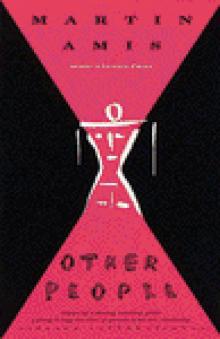 Other People
Other People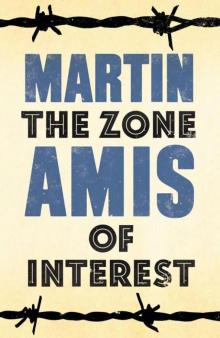 The Zone of Interest
The Zone of Interest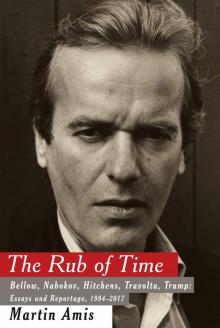 The Rub of Time: Bellow, Nabokov, Hitchens, Travolta, Trump
The Rub of Time: Bellow, Nabokov, Hitchens, Travolta, Trump Koba the Dread
Koba the Dread Success
Success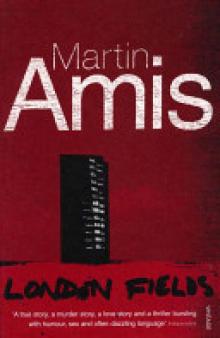 London Fields
London Fields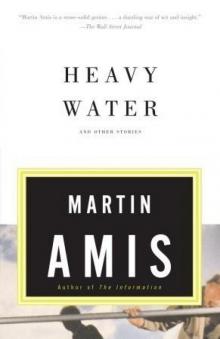 Heavy Water: And Other Stories
Heavy Water: And Other Stories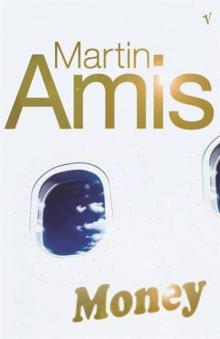 Money
Money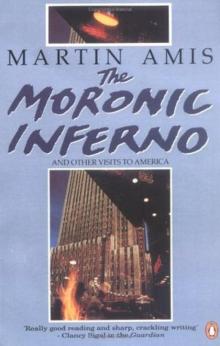 The Moronic Inferno and Other Visits to America
The Moronic Inferno and Other Visits to America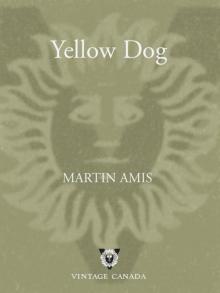 Yellow Dog
Yellow Dog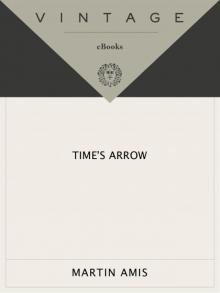 Time's Arrow
Time's Arrow Experience: A Memoir
Experience: A Memoir Einstein's Monsters
Einstein's Monsters The Pregnant Widow
The Pregnant Widow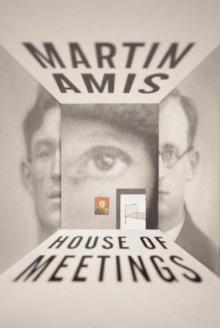 House of Meetings
House of Meetings The Information
The Information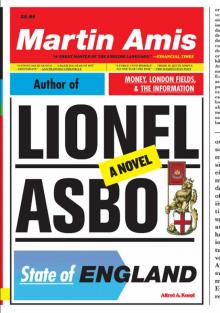 Lionel Asbo: State of England
Lionel Asbo: State of England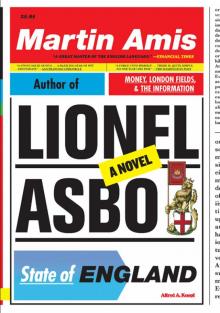 Lionel Asbo
Lionel Asbo Heavy Water and Other Stories
Heavy Water and Other Stories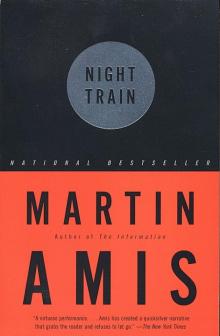 Night Train
Night Train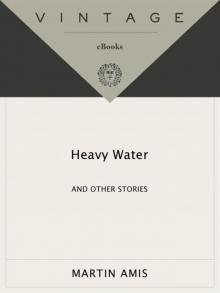 Heavy Water
Heavy Water The War Against Cliche: Essays and Reviews 1971-2000 (Vintage International)
The War Against Cliche: Essays and Reviews 1971-2000 (Vintage International)